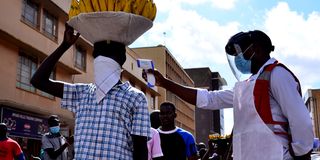Covid lockdown worsened violence against men – study

A Uganda Red Cross volunteer conducts a temperature check on a vendor in Kampala on March 30. A study has shown that men were the most victims of gender based violence in Kampala city slums during Covid-19 lockdown. PHOTO / ABUBAKER LUBOWA
What you need to know:
Many men were psychologically tortured due to their inability to provide for their families.
A new study shows that men are worst victims of gender based violence in Kampala city slums during the Covid-19 induced lockdown.
The study titled “Building peaceful urban communities in Kampala amidst Covid-19” was carried out by researchers from Makerere University’s College of Humanities and Social Sciences between July and September with funding from the Research and Innovation Fund.
The study centred on social unrest and conflict during and beyond the Covid-19 pandemic and the mechanisms of conflict resolution used in Kampala slums of Makerere Kivulu, Kikoni, Katanga and Kisenyi.
At least 24 local council leaders and 124 ordinary people were interviewed during the study. Of the total respondents, 51 per cent were male while 49 per cent were female.
Researchers sought to establish the plight of slum dwellers during lockdown, the types of conflicts among couples, and to strengthen the capacity of local leaders in slum areas to mitigate Covid-19.
Dr Venranda Mbabazi, one of the researchers, said majority of men reported that their spouses denied them conjugal rights and openly embarrassed them before their children, accusing them of failure to provide basic needs.
“Majority of men were psychologically tortured due to their inability to provide as women often confronted and abused them hence triggering conflicts in homes,” she said.
She said many men explained that they could not provide for their families during the lockdown due to loss of jobs.
Although government provided food rations, Dr Mbabazi said most families admitted to receiving small quantities which could not last for a week.
“We found out that whereas men claimed being unable to provide for their families, they returned home drunk and this sparked off fights with their wives who asked where they had got the money to drink alcohol,” she said.
However, she explained that they carried out a qualitative study and did not base on numbers because the project was short-term hence they could not quantify data related to the findings.
There were also increased cases of divorce or separation, early marriages as a result of closure of schools, increased labour and brutality from security personnel.
Dr Charlotte Mafumbo, a co-researcher of the study, said patients with terminal illness such as diabetes and cancer were abandoned as families couldn’t easily access the health facilities while majority of children were left malnourished.
Asked why Local Defence Unit (LDU) officers used excess force while enforcing curfew, Capt Francis Agaba, the operations officer for Kampala Central acknowledged there were a few errors but that officers who brutalised people have since been convicted.
He said most people deliberately faulted curfew guidelines and provoked enforcement officers. “The security personnel did play a big role during lockdown and we should thank them for the good job because they were enforcing a presidential directive,” he said.




